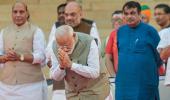Jaishankar is the first foreign secretary to head the Ministry of External Affairs as minister.

Nearly 16 months after he retired as foreign secretary, S Jaishankar was on Friday back in the External Affairs ministry but this time as minister, a surprise move aimed at adding further strategic heft to India's foreign policy.
The 64-year-old seasoned diplomat was welcomed at the headquarters of the ministry by his former colleague Vijay Gokhale, who succeeded Jaishankar as foreign secretary in January last year.
The choice of Jaishankar as External Affairs minister, a rare transition from career diplomat to minister, is seen as a reflection of Prime Minister Narendra Modi's priority for aggressive diplomacy, in sync with the overall aim to raise India's a global stature.
Jaishankar is the first foreign secretary to head the Ministry of External Affairs as minister.
K Natwar Singh, who was also a diplomat, was India's External Affairs minister between May 22, 2004 to November 6, 2005.
He quit the IFS to join politics in the early 1980s.
Considered an expert on China and the United States, the new External Affairs minister's moves will be keenly watched to see whether he brings any changes in India's approach in dealing with a hostile Pakistan.
Jaishankar was India's ambassador to the US when Modi visited in September 2014 and made the famous speech before a packed Madison Square Garden in New York.
As External Affairs minister, Jaishankar will also have to deal with overall expectations of expanding India's global influence and stature, particularly in key multilateral forums like G-20, Shanghai Cooperation Organisation and BRICS (Brazil, Russia, India, China, South Africa).
However, a major focus of the ministry under his leadership is likely to be on further boosting India's trade and defence ties with the US, Russia, France, Japan and the European Union as well as with the countries of the neighbourhood.
Another challenge for him will be to further strengthen India's ties with China, badly hit by the Doklam standoff in mid 2017.
His approach towards Iran after the US discontinued the temporary waiver to India from sanctions on buying crude oil will also be keenly watched.
The 64-year-old -- who is not a member of either the Rajya Sabha or the Lok Sabha at this point -- is also likely to push for deepening cooperation with the African continent where China is fast expanding its influence and presence.
Getting the long-awaited membership of the UN Security Council and Nuclear Suppliers Group is expected to be another area of interest of the new government.
India has also been trying enhance ties with the Gulf region as well as the hydrocarbon rich Central Asia, and Jaishankar is set to ensure continuity on it.
Jaishankar, son of the late K Subrahmanyam, one of India's leading strategic analysts, was a key member of the Indian team which negotiated the landmark Indo-US nuclear deal.
The deal, initiated in 2005, took several years to craft, and was signed by the UPA government headed by Manmohan Singh in 2007.
Jaishankar's appointment as foreign secretary in January 2015 evoked a sharp reaction from various quarters over the timing of the government's decision to remove Sujatha Singh.
A 1977-batch IFS officer who has also served as ambassador to China, Jaishankar played a key role in resolving the crisis following the incursion in Ladakh's Depsang and the Doklam stand-off, handling the tough negotiations with Beijing.
Among other positions, Jaishankar has been India's high commissioner to Singapore and ambassador to the Czech Republic.
Last year, the Tata Group appointed Jaishankar, who was foreign secretary from January 2015 to January 2018, as its president for global corporate affairs, within three months of his retirement from the government service.
A graduate of St Stephen's College, Jaishankar is an MA in Political Science and an MPhil and PhD in International Relations from Jawaharlal Nehru University (JNU).
Jaishankar is married to Kyoko Jaishankar and has two sons and a daughter.
In 2019, Jaishankar was conferred with the Padma Shri, the fourth highest civilian award of the country.











 © 2025
© 2025